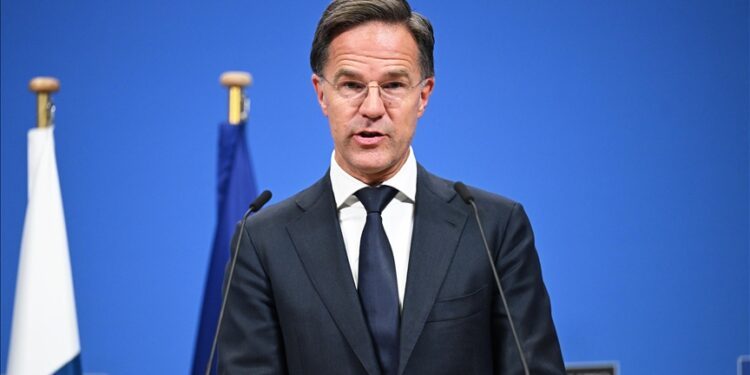GENEVA
The head of NATO on Thursday emphasized the need for “robust” security guarantees to end Russia’s “terrible aggression” in Ukraine, adding Kyiv’s hand should be strengthened at the negotiation table.
Mark Rutte’s remarks came in at a news conference with the President of Slovakia Peter Pellegrini during his visit to Slovakia.
“We all want to see an end to the terrible aggression against Ukraine, and it is vital that any deal reached brings an enduring peace that Russia will never again try to take one more square kilometer of Ukrainian land,” Rutte said.
“This will require robust security guarantees,” he said, noting that NATO allies are actively discussing what that might entail.
Underlining Europe’s “vital role in securing peace in Ukraine,” he said: “We have been in close touch with the US administration on this at every level, and we all agree that we need an enduring peace in Ukraine.”
“At the same time, we should continue to strengthen Ukraine’s hands so that they can come to the negotiating table from a position of strength as an alliance,” he added.
Asked about US President Donald Trump’s initiative to negotiate peace directly with Russia, Rutte said he was “a bit irritated” when he heard it for the first time in Munich.
He emphasized the significance of US special envoy General Keith Kellogg’s visit to NATO headquarters, where he briefed ambassadors on Monday.
He also highlighted French President Emmanuel Macron’s efforts in organizing a meeting in Paris on the topic and noted that further discussions would follow.
Rutte downplayed the importance of individual meetings, stressing that what truly matters is Europe’s ongoing dialogue on structuring security guarantees for Ukraine after a peace agreement, saying it’s “not important” who is or is not there.
“What’s important is that somehow in Europe, we are discussing how to organize the security guarantees into Ukraine post a peace deal. It’s a step-by-step process,” he added.
Regarding the defense spending, the NATO chief said that 2% is “not enough,” describing the situation as “clear.”
“Growing threats will require greater investment,” he said, adding: “I think it will be considerably more than 3% at least.”
However, he said the percentage is under consideration, and the alliance should decide on a timetable.






